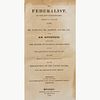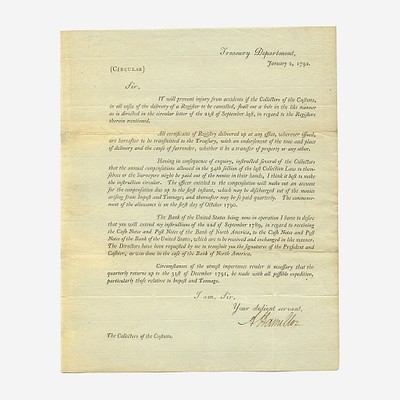[Hamilton, Alexander] [Constitution] The United States Chronicle: Political, Commercial, and Historical
About Seller
2400 Market St
Philadelphia, PA 19147
United States
Established in 1805, Freeman’s Auction House holds tradition close, with a progressive mind-set towards marketing and promotion, along with access to a team of top experts in the auction business. And now with offices in New England, the Southeast, and on the West Coast, it has never been easier to ...Read more
Two ways to bid:
- Leave a max absentee bid and the platform will bid on your behalf up to your maximum bid during the live auction.
- Bid live during the auction and your bids will be submitted real-time to the auctioneer.
Bid Increments
| Price | Bid Increment |
|---|---|
| $0 | $25 |
| $500 | $50 |
| $1,000 | $100 |
| $2,000 | $200 |
| $3,000 | $250 |
| $5,000 | $500 |
| $10,000 | $1,000 |
| $20,000 | $2,000 |
| $30,000 | $2,500 |
| $50,000 | $5,000 |
| $100,000 | $10,000 |
About Auction
Oct 25, 2021
Freeman's is honored to present The Alexander Hamilton Collection of John E. Herzog, a single-owner sale of Alexander Hamilton material, on October 25. Curated by Darren Winston, Head of the Books and Manuscripts Department. Freeman's info@freemansauction.com
- Lot Description
[Hamilton, Alexander] [Constitution] The United States Chronicle: Political, Commercial, and Historical
New York ratifies the Constitution of the United States
"We, the Delegates of the People of the state of New-York, duly elected and met in Convention, having maturely considered the Constitution for the United States of America, agree to on the 17th day of September, 1787, by the Convention then assembled at Philadelphia in Pennsylvania State and having also seriously and deliberately considered the present situation of the United States, DO DECLARE AND MAKE KNOWN..."
Providence, (Rhode Island): Bennett Wheeler, Thursday, August 14, 1788. Vol. V, Number 242. Bifolium sheet, 16 3/4 x 10 1/2 in. (425 x 267mm). (4) pp. Printed newspaper in three columns. Reports on the first page the ratification of the Constitution by the state of New York. Creasing from original folds; toned; scattered spotting. Lot includes a copy of The Federalist (Philadelphia: M'Carty and Davis, 1826. A New Edition).
Largely through the Herculean efforts of Alexander Hamilton, New York became the 11th state to ratify the Constitution, by a vote of 30-27, on July 26, 1788, one of the last states to do so. The debates concerning ratification held during the New York ratifying convention were contentious, with the pro-adoption Federalists, led by Hamilton (the only delegate from New York at the Constitutional Convention to sign the Constitution) pitted against the anti-adoption faction, the Anti-Federalists, led by New York Governor, George Clinton, and New York merchant Melancton Smith. The Anti-Federalists, wary of Federal encroachment on state's rights, sought amendments to the Constitution, as well as the inclusion of a Bill of Rights before they would consider throwing their support behind it. Ultimately, with the adoption by New Hampshire and Virginia occurring during New York's convention, the Federalists prevailed, but the Anti-Federalists managed to include the aforementioned list of proposed amendments and a Bill of Rights, with the stipulation that they were to be considered before the state would fully participate in the new government.
Printed in Rhode Island, the last state to ratify the Constitution. After much controversy, Rhode Island ratified the document over two years after this publication, on May 29, 1790. They were the only state to not send a delegate to the Constitutional Convention that approved it, on September 17, 1787. They made 11 unsuccessful attempts to hold a state ratifying convention, only approving it after the United States threatened a trade embargo against them. The state's sole representative, Benjamin Bourne, arrived five months late to the First Congress, on August 31, 1790.
- Shipping Info
-
No lot may be removed from Freeman’s premises until the buyer has paid in full the purchase price therefor including Buyer’s Premium or has satisfied such terms that Freeman’s, in its sole discretion, shall require. Subject to the foregoing, all Property shall be paid for and removed by the buyer at his/ her expense within ten (10) days of sale and, if not so removed, may be sold by Freeman’s, or sent by Freeman’s to a third-party storage facility, at the sole risk and charge of the buyer(s), and Freeman’s may prohibit the buyer from participating, directly or indirectly, as a bidder or buyer in any future sale or sales. In addition to other remedies available to Freeman’s by law, Freeman’s reserves the right to impose a late charge of 1.5% per month of the total purchase price on any balance remaining ten (10) days after the day of sale. If Property is not removed by the buyer within ten (10) days, a handling charge of 2% of the total purchase price per month from the tenth day after the sale until removal by the buyer shall be payable to Freeman’s by the buyer. Freeman’s will not be responsible for any loss, damage, theft, or otherwise responsible for any goods left in Freeman’s possession after ten (10) days. If the foregoing conditions or any applicable provisions of law are not complied with, in addition to other remedies available to Freeman’s and the Consignor (including without limitation the right to hold the buyer(s) liable for the bid price) Freeman’s, at its option, may either cancel the sale, retaining as liquidated damages all payments made by the buyer(s), or resell the property. In such event, the buyer(s) shall remain liable for any deficiency in the original purchase price and will also be responsible for all costs, including warehousing, the expense of the ultimate sale, and Freeman’s commission at its regular rates together with all related and incidental charges, including legal fees. Payment is a precondition to removal. Payment shall be by cash, certified check or similar bank draft, or any other method approved by Freeman’s. Checks will not be deemed to constitute payment until cleared. Any exceptions must be made upon Freeman’s written approval of credit prior to sale. In addition, a defaulting buyer will be deemed to have granted and assigned to Freeman’s, a continuing security interest of first priority in any property or money of, or owing to such buyer in Freeman’ possession, and Freeman’s may retain and apply such property or money as collateral security for the obligations due to Freeman’s. Freeman’s shall have all of the rights accorded a secured party under the Pennsylvania Uniform Commercial Code.
-
- Buyer's Premium



 EUR
EUR CAD
CAD AUD
AUD GBP
GBP MXN
MXN HKD
HKD CNY
CNY MYR
MYR SEK
SEK SGD
SGD CHF
CHF THB
THB![[Hamilton, Alexander] [Constitution] The United States Chronicle: Political, Commercial, and Historical](https://s1.img.bidsquare.com/item/l/9470/9470997.jpeg?t=1MwoEV)
![[Hamilton, Alexander] [Constitution] The United States Chronicle: Political, Commercial, and Historical](https://s1.img.bidsquare.com/item/s/9470/9470997.jpeg?t=1MwoEV)












